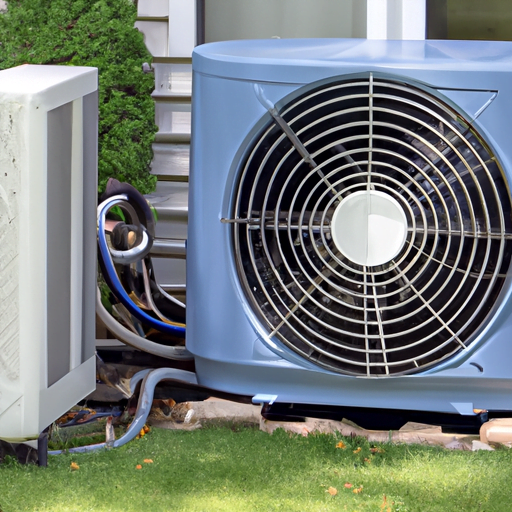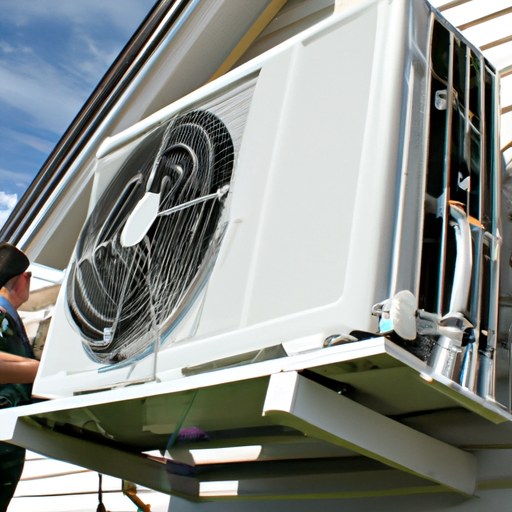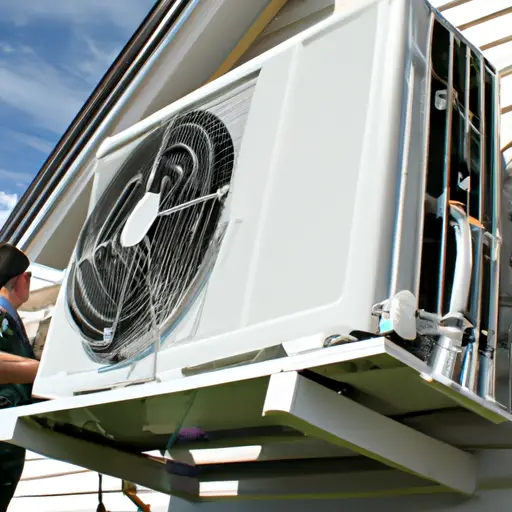Have you ever wondered how efficient a heat pump is at different temperatures? You know, those fancy devices that can both heat and cool your home? Well, let me tell you, it’s a fascinating topic. In this article, we’ll delve into the efficiency of a heat pump at different temperatures, and you’ll be amazed at what you learn.
So, here’s the thing about heat pumps: they’re designed to be energy-efficient, but their performance can vary depending on the outside temperature. At higher temperatures, heat pumps can work wonders, efficiently extracting heat from the surroundings and transferring it indoors. However, as the temperature drops, the efficiency of the heat pump decreases. It struggles to draw heat from the cold outside air, which means it can become less effective in colder climates.
But don’t worry, we’re not saying heat pumps are useless in colder temperatures. They just become less efficient. In fact, they can still provide heat even when it’s freezing outside. However, reaching your desired indoor temperature may take longer or require the heat pump to work harder, resulting in a higher energy consumption. So, it’s important to understand the efficiency of a heat pump at different temperatures to make informed decisions about your heating and cooling needs.
In the upcoming article, we’ll explore the factors that affect the efficiency of a heat pump at different temperatures, including the type of refrigerant used, the size of the heat pump, and the insulation of your home. We’ll also provide some tips and tricks to maximize the efficiency of your heat pump, regardless of the outside temperature. Trust me, it’s going to be an enlightening read, and you’ll come away with a better understanding of how heat pumps work and how to optimize their efficiency.
The Efficiency of a Heat Pump at Different Temperatures

Understanding Heat Pumps
A heat pump is a highly efficient heating and cooling system that can provide both warmth and coolness to your home. Unlike traditional heating systems that generate heat, a heat pump transfers heat from one place to another. This makes it a more energy-efficient and cost-effective option for maintaining comfortable temperatures in your home.
What is a Heat Pump?
A heat pump is a mechanical device that transfers heat from a source at a lower temperature to a destination at a higher temperature. It achieves this by utilizing refrigerant cycles that absorb heat from the outside air or ground and release it indoors. In warmer months, the process is reversed, and the heat pump removes heat from your home and releases it outside, providing cooling.
How Does a Heat Pump Work?
A heat pump works by utilizing the principles of refrigeration and thermodynamics. It consists of four main components: an evaporator, a compressor, a condenser, and an expansion valve. The refrigerant, a chemical compound with excellent heat transfer properties, flows through these components to transfer heat.
First, the refrigerant absorbs heat from the air or ground in the evaporator, turning into a low-pressure gas. The compressor then compresses the gas, increasing its temperature and pressure. The high-pressure gas then flows into the condenser, where it releases heat to the indoor environment or outside air, depending on the mode of operation. Finally, the expansion valve reduces the pressure of the refrigerant, enabling it to return to the evaporator to start the cycle again.
Efficiency of Heat Pumps
Heat pump efficiency is measured by the coefficient of performance (COP), which calculates how much heat a heat pump can transfer compared to the amount of energy it consumes. The higher the COP, the more efficient the heat pump. Heat pump efficiency can vary depending on several factors.
Factors Affecting Heat Pump Efficiency
Several factors can affect the efficiency of a heat pump. The temperature difference between the heat source and the destination, known as the temperature lift, is a significant factor. The larger the temperature lift, the harder the heat pump has to work to transfer heat, reducing its efficiency. Other factors include the type of refrigerant, the size and insulation of your home, and the quality of installation.
Efficiency at Various Temperatures
Heat pumps operate efficiently in a specific temperature range. In mild climates with moderate winter temperatures, heat pumps can maintain high efficiencies. However, their efficiency decreases as the outdoor temperature drops. Most standard air-source heat pumps operate efficiently in temperatures above 25 to 30 degrees Fahrenheit. Below these temperatures, the heat pump may struggle to extract heat from the air, and supplementary heat sources may be necessary.

Optimal Temperature Range
While heat pumps can provide efficient heating and cooling in a wide range of temperatures, there are optimal temperature ranges that allow for the highest efficiency and performance.
Ideal Temperatures for Heat Pump Efficiency
The ideal outdoor temperature range for heat pump efficiency is between 40 to 60 degrees Fahrenheit. In this range, the heat pump can extract a significant amount of heat from the air or ground, providing efficient heating to your home. The closer the outdoor temperature is to the ideal range, the higher the efficiency of the heat pump.
Temperature Limitations
Heat pumps have limitations in extreme temperatures. In extremely cold climates, where temperatures regularly fall below freezing, the efficiency of heat pumps decreases due to the larger temperature lift. It becomes more challenging for the heat pump to extract heat from the air, and supplemental heating may be necessary to meet your home’s heating requirements. Similarly, in extremely hot climates with high ambient temperatures, the heat pump’s efficiency can be reduced.
Heat Pump Performance in Cold Climates
While heat pumps may experience reduced efficiency in cold climates, they are still capable of providing heat.
Winter Operation of Heat Pumps
In colder climates, heat pumps employ various strategies to ensure heating efficiency. Some models are equipped with backup heating systems, which automatically activate when the heat pump’s efficiency drops below optimal levels. These systems can include electric resistance heaters, gas furnaces, or even geothermal heating. The backup system ensures that your home remains warm and comfortable, even in extremely cold weather conditions.
Performance Below Freezing
Most standard air-source heat pumps struggle to extract heat efficiently when the outdoor temperature drops below freezing. However, advanced technologies such as dual-fuel heat pumps or cold-climate heat pumps are specifically designed to operate effectively in extremely cold temperatures. These systems utilize additional features like low-ambient temperature sensors and variable speed compressors to maintain efficient operation even in sub-freezing conditions.
Heat Pump Performance in Hot Climates
Heat pumps are not only effective in providing heating during the winter months but also in cooling your home during the summer.
Summer Operation of Heat Pumps
During the summer, heat pumps work in reverse to provide cooling. They extract heat from your home and release it outside, effectively cooling the indoor space. The efficiency of a heat pump in cooling mode is measured by its Energy Efficiency Ratio (EER). The higher the EER, the more efficient the heat pump is at cooling your home.
Performance in High Ambient Temperatures
Just as extreme cold temperatures can affect heat pump efficiency, high ambient temperatures can also impact performance. In hot climates with scorching temperatures, some heat pumps may struggle to extract heat efficiently. It is important to choose a heat pump model with a high Seasonal Energy Efficiency Ratio (SEER) to ensure efficient cooling operation even in high ambient temperatures.
Factors Impacting Heat Pump Efficiency
Apart from temperature, several other factors can impact the efficiency of your heat pump.
Insulation and Air Leakage
The insulation and air leakage of your home play a significant role in heat pump efficiency. Proper insulation ensures that heat loss or gain is minimized, allowing the heat pump to operate more efficiently. Similarly, air leakage can cause conditioned air to escape, leading to energy wastage and reduced efficiency. Ensuring a well-insulated and sealed home can greatly improve the efficiency of your heat pump.
Sizing and Installation
Proper sizing and installation of your heat pump are crucial for achieving optimal efficiency. Undersized or oversized heat pumps may not operate efficiently and can result in increased energy consumption. It is essential to consult with a professional HVAC technician to determine the correct size and to ensure a proper installation.
Regular Maintenance
Regular maintenance is essential to keep your heat pump operating at peak efficiency. This includes cleaning or replacing air filters, checking refrigerant levels, inspecting electrical connections, and ensuring the proper functioning of all components. Routine maintenance not only improves the efficiency of your heat pump but also extends its lifespan.
Tips for Optimal Heat Pump Efficiency
By implementing a few strategies, you can maximize the efficiency of your heat pump and minimize energy consumption.
Thermostat Settings
Optimizing your thermostat settings can greatly impact heat pump efficiency. Set your thermostat to the optimal temperature range recommended for heat pump operation. Avoid frequently adjusting the temperature, as it can affect overall efficiency. Additionally, explore the use of programmable or smart thermostats to optimize temperature settings based on your schedule.
Zone Control
Implementing zone control in your home allows you to heat or cool specific areas independently. This can significantly reduce energy consumption by only conditioning occupied areas. By closing vents in unoccupied rooms, you can redirect airflow to areas where it is needed, ensuring maximum efficiency.
Backup Heat Sources
Consider investing in a backup heating source, such as a gas furnace or electric resistance heaters, to supplement your heat pump during extreme temperatures. This can ensure that you have a reliable heat source when your heat pump’s efficiency is compromised.
Energy Savings with Heat Pumps
Compared to traditional heating systems, heat pumps offer significant energy savings.
Comparing Heat Pump Efficiency with other Heating Systems
Heat pumps can provide up to four times more energy than they consume, resulting in higher energy efficiency. In comparison, electric resistance heaters typically have an efficiency of 100%, while gas furnaces range between 80-98% efficiency. This makes heat pumps a more environmentally friendly and cost-effective heating solution.
Long-Term Cost Benefits
While the upfront cost of installing a heat pump may be higher than traditional heating systems, the long-term cost benefits are substantial. The energy savings achieved by using a heat pump can result in lower utility bills over time, offsetting the initial investment.
Considerations for Off-Grid Living
Off-grid living presents unique challenges when it comes to heating and cooling. However, heat pumps can still be a viable option in certain circumstances.
Heat Pump Viability for Off-Grid Homes
If you are considering heat pumps for off-grid living, it is essential to assess your energy source. Heat pumps typically require electricity to operate, and being off-grid may limit your access to reliable power. In such cases, alternative energy sources like solar panels, wind turbines, or even geothermal systems can be used to power your heat pump, providing a sustainable off-grid heating and cooling solution.
Alternative Energy Sources
Utilizing alternative energy sources can lower your dependence on the grid and reduce your environmental footprint. This is particularly beneficial for off-grid homes, where self-sufficiency is the goal. By harnessing renewable energy, you can power your heat pump and enjoy the energy-efficient benefits it offers.
Conclusion
The efficiency of a heat pump is influenced by various factors, including temperature, insulation, sizing, and maintenance. Understanding the optimal temperature range for efficient heat pump operation is crucial in maximizing its performance. While extreme temperatures can impact heat pump efficiency, advanced technologies and backup heating systems can provide reliable heating and cooling in even the harshest climates. By implementing energy-saving techniques and considering alternative energy sources, heat pumps can offer long-term cost benefits and sustainable solutions for both on-grid and off-grid living. So, explore the efficiency of a heat pump and make it a smart choice for your heating and cooling needs.




